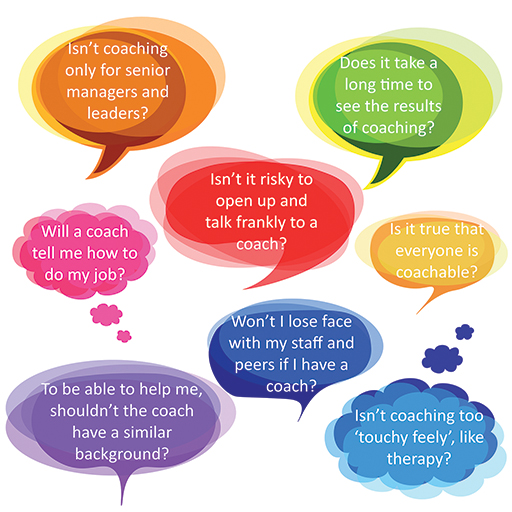4 Coaching misconceptions
The University of Exeter HR department (no date) has compiled a useful list of misconceptions about coaching in the workplace, presented in the form of common questions from staff, including:
You can explore some of these questions further in Activity 4.
Activity 4 Doubts about coaching?
Here are excerpts from four of the answers supplied by Exeter. Can you match them to the question?
- a.The nature of the coaching relationship is characterised by mutual trust, mutual respect and freedom of expression. Confidentiality is one of the hallmarks of coaching.
- b.Most people are coachable some of the time, but not everyone is coachable all of the time. An important factor in coaching is the readiness of the coachee.
- c.While coaching is not intended to be a quick fix, many coachees experience tangible results after one or two coaching sessions. Coaching for engaged and motivated people … can lead to some remarkable and rapid changes in thinking and behaviour.
- d.It’s more important for the coach to have the skills and abilities to help you transform yourself and acquire the skills you need. The most helpful coach is one who listens to you and helps you reflect on your choices, behaviours, interpretations and judgements.
Isn’t coaching only for senior managers and leaders?
Does it take a long time to see the results of coaching?
Isn’t it risky to open up and talk frankly to a coach?
Isn’t coaching too ‘touchy feely’, like therapy?
Is it true that everyone is coachable?
Will a coach tell me how to do my job?
To be able to help me, shouldn’t the coach have a similar background?
Won’t I lose face with my staff and peers if I have a coach?
Comment
- a.Isn’t it risky to open up and talk frankly to a coach?
- b.Is it true that everyone is coachable?
- c.Does it take a long time to see the results of coaching?
- d.To be able to help me, shouldn’t the coach have a similar background?
Do any of these questions reflect your own queries or concerns about coaching? If you want to read more of the Exeter article, here’s the link: 13 Myths About Coaching [Tip: hold Ctrl and click a link to open it in a new tab. (Hide tip)]
There are many online articles and blog posts aimed at dispelling the myths about coaching. Another misconception (Patterson, 2016) is the view that ‘if you hire the coach, your transformation is guaranteed’.
While a coach can do many things to support and motivate, providing tools, strategies, someone to be accountable to etc., it is the coachee’s responsibility to take action. As Patterson puts it:
‘Hiring the coach is just the first step. You then need to learn, study, implement, iterate, iterate, iterate, learn, implement, execute, take action – don’t-forget-to-get-a-cup-of-coffee-before-you, again – take action, iterate, and most of all KEEP GOING.’

